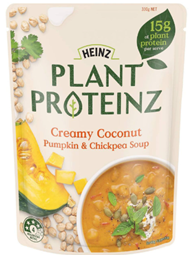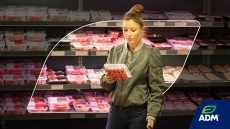Behind Kraft Heinz’s plant-based category push: ‘We’re liberating the Beanz from the can’

The Kraft Heinz Company is synonymous with tomato ketchup and baked beans. Both products are plant-based and have been since they first entered the market – decades before the plant-based trend took hold.
Indeed, the company could be considered plant-forward since the inception of the H. J. Heinz Company in 1869. For Kraft Heinz – the result of a merger between Kraft Food Group and H.J. Heinz Holding Corporation in 2015 – being plant-based is nothing new.
What is novel, is the expansion of Kraft Heinz’s plant-based product portfolio, which is launching into multiple new categories, ranging from pasta sauce to meat-free burgers and pouch-packed soups.
More inclusive, ‘less activist’, plant-based messaging
Although Heinz Beanz and Heinz Tomato Ketchup are both plant-based, neither blatantly markets itself as such. This is because celebrating plants is embedded in the company’s history, suggests Cristina Kenz, the company’s Chief Growth & Sustainability Officer, International.
“At Heinz, we are just plant-based. Our forefather Henry Heinz was one of the first plant-based creators, in the way he looked at agriculture, in the way he loved ingredients, and in the way we have carried that over 150 years to make us the very first plant-based makers.”
Such a foundation sets up the company well for a plant-forward future, believes Kenz. “If you fast-forward 100 years and look into the strategy we want to set up in the future, we believe in taste, nutrition, planet. Industry forces is what is going to make the difference in food. We’ll always give you a tasty product, nutrition is a must…and [caring for the planet] is the big thing we need to do collectively,” she told FoodNavigator.
“Whatever we do to the food system has to impact as positively as it can to the planet [in terms of] sustainability and communities.”
Being a ‘gigantic’ brand means that Kraft Heinz can make a real difference. The Chief Growth & Sustainability Officer also believes that its established market position helps bring the ‘plant-based message’ in a more ‘edible’ way.
“It becomes something achievable for everyone. It becomes something that is more fun and less activist. Even though we want to do the right thing, [we use] language that is much more [inclusive of] everybody, and this is where our products make sense.”
Free the Beanz…and put them on pizza
Kraft Heinz’s plant-based push into new categories can be classified into two products: those that contain the company’s iconic ‘Beanz’, and those that don’t. In both scenarios, the company is drawing on its history, suggested Kenz. “Overall, this is a big relook at the portfolio we’re doing to align ourselves with the [foundations] of who we are.”
A number of products in Kraft Heinz’ expanded product portfolio contain the key ingredient in its infamous Heinz Beanz product: navy beans (otherwise known as haricot beans). But instead of selling them inside the can, the company is ‘liberating’ the beans. In-house, Kraft Heinz refers to this strategy as ‘Beanz Liberation’.
One of the aims of Beanz Liberation is to reach new audiences. Canned beans were first produced by the Heinz company in 1895. Although still enjoyed the world over, younger generations who perhaps didn’t grow up on baked beans on toast like their parents, may find the product ‘less relevant’, explained Kenz.

“We still have a lot of people eating Heinz Beanz, but we thought we had to take the beans out of the can to reach new tribes.”
Product examples include the new Heinz Meatless burgers and mince, which are ‘powered by Beanz’, and have already launched in the Netherlands. The offerings are high in protein, and free of artificial flavours, colours, preservatives, and soy. “It’s a different way to try and get different tribes to modernise…” explained the Chief Growth & Sustainability Officer.
The idea is to ‘look at beans in different ways’, she continued. “One of those is from a technological perspective, [identifying] what it brings a unique product. And what is different, is that it’s powered by Beanz. It’s something we’ve known how to work with for the last 100 years. We really understand beans…from how to harvest the cleanest product, to how to create products.”
Initial consumer response has been positive. “People are loving it…because even though [the alt meat category] is a crowded space, this is different. First of all, it’s been launched by Heinz…and it’s made with a superior protein, which makes up the base for us. And then, of course, the delivery of the product: the texture is great, the taste is great.”
Kraft Heinz is selling its Heinz Meatless burgers into both retail and foodservice to reach its two key target markets: vegetarians/vegans and flexitarians.
Other products to launch under Kraft Heinz’s Beanz Liberation strategy include its Heinz Beanz Bowls: a range of frozen meals available in flavours Smoky Chilli, Fragrant Coconut, and Herby Tomato. According to the company, these products provide two of your 5-a-day, 20g of protein per serving, and are high in fibre.
More playful examples include Heinz Beans Hash Browns (hash browns filled with baked beans) and a line of Heinz Baked Beanz Pizza products.
A push into pasta sauce, soup, and ready meal categories
Amongst the new products hitting shelves that don’t contain navy beans include the company’s new line of pasta sauces. Flavours include Tomato Grana Padano & Mascarpone, Mediterranean Vegies & Chunky Tomatoes, and Sundried Cherry Tomato & Basil.
In the UK, the move into the pasta sauce category has been accompanied by an advertising campaign suggesting that as a major player in the tomato ketchup field, Kraft Heinz is an obvious choice for the pasta sauce category. One advertisement featuring the company’s seven new flavours of sauces reads: ‘150 years too late. 7 ways to apologise’.

“This new launch is a beautiful product that we have reinvited with natural great ingredients and great nutritionals,” commented Kenz.
The company has also rolled out a range of soup pouches. The Heinz Plant Proteinz line includes flavours such as Mexican Style Corn & Black Bean Soup with Sweet Potato & Coriander, and Lentil & Roasted Sweet Potato Dahl with Ginger & Turmeric. A portion of Plant Proteinz soup contains 15g of plant protein.
Another new range is being stocked in the frozen aisle of the supermarket: Heinz One Pan meals contain two servings for either lunch or dinner. According to the company, the ‘no-prep’ dishes are available as paella or risotto – dishes that ‘typically take a lot of time to prepare at home’. To prepare Heinz One Pan meals, however, ‘all you need is a pan’. Heinz One Pan frozen meals range exists in 3 flavours: Italian Style Risotto, Spanish Style Veg Paella, and Moroccan Style Couscous.
Meal kits from the supermarket
At the same, in a move that further expands Kraft Heinz’

portfolio, the company recently launched a new meal kit and cooking range, in collaboration with design firm Designit, for consumers looking to explore new cuisines at home.
SOSU from Amoy aims to ‘bridge’ Pan-Asian regional cuisine with the ‘practicality’ of quick meals preparation. Each meal kit includes a recipe and specialised ingredients, and can be suitable for vegetarian and vegan shoppers.
“We looked at meal kits [on the market] and observed that for some Asian cuisines, such as Vietnamese and Korean, you need several ingredients. It can be quite an undertaking,” explained Kenz. “What we’ve done is made it easy. We grabbed the ingredients and put them in the box.”
SOSU from Amoy is being sold in supermarkets in the UK. Unlike meal kits ordered and delivered to customers’ doors, Kraft Heinz’s offering does not include every ingredient. “There are no proteins in there, for example. If you want to cook with tofu, you’ll need to buy it [separately].” SOSU from Amoy is launching into Tesco stores in the UK starting with its Japanese and Korean lines.

























